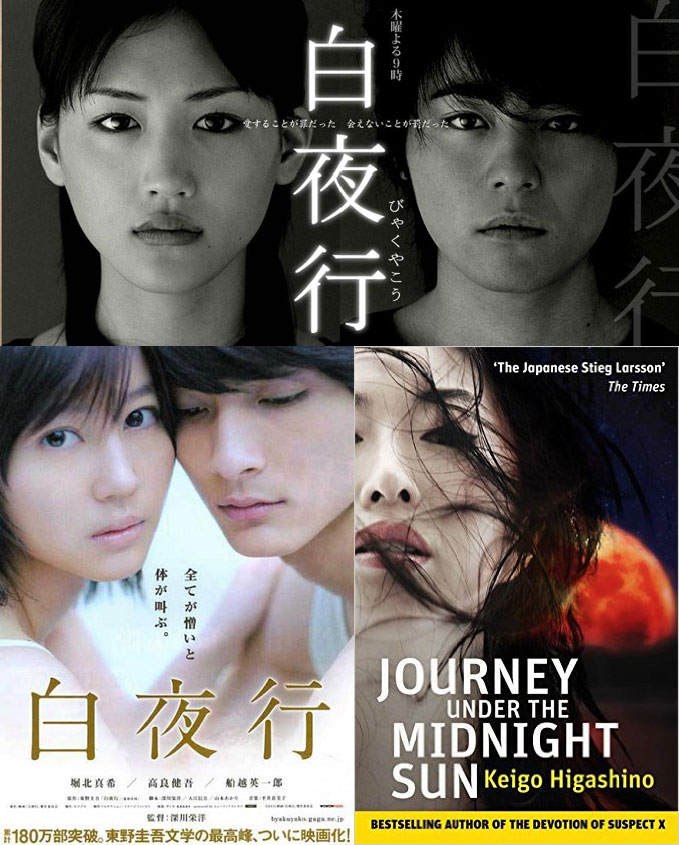
Life as a purist is hard.
A pawnshop owner is killed in 1973 in Osaka. Detective Sasagaki Junzo, who has been assigned to the case, begins to piece together the connection of two young people who are seemingly involved in the crime – the son of the victim, and the suspect’s daughter. Over the years, Sasagaki tracks the whereabouts of these two people as he tries to bring the case to a close…
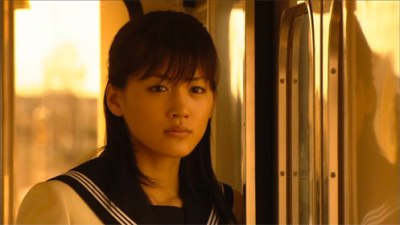
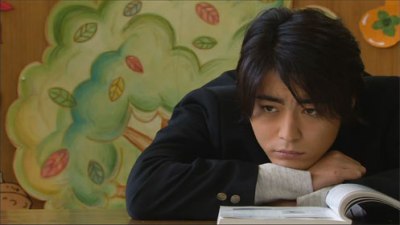
I had wanted to watch Byakuyako (both the drama and film adaptations) soon after I finished the novel (published English title being Journey Under the Midnight Sun) by Higashino Keigo, but somehow never quite found the time until now. I remember staying up nights just to finish reading that chapter and the next, for the plot was intriguing and the story was told from an unusual perspective. So I’m glad for the distance, for it allowed the novel to sink in and for me to better appreciate it as I reread bits of it while watching the drama. I’d heard a lot about the drama adaptation, how dark and well-made it was, and reviews online were mostly positive.

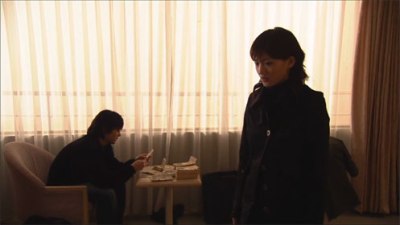
Higashino is a prolific mystery writer whose works have been adapted into dramas and films. I’m pretty fond of whatever Higashino works I could get my hands on, and have always enjoyed the stuff that was adapted to screen, so I had expected to give the Byakuyako drama the thumbs-up after I was done. Alas, it wasn’t quite the case, and I know it’s because I read the novel prior to watching the drama, so it was difficult for me to view it as a standalone no matter how I tried. I believe most of the positive reviews stemmed from the fact that the drama came out in 2006 (the film adaptation in 2011), while the novel translation was out in 2015, so drama viewers thought it was a fresh concept and had little to compare with unless they read the original Japanese novel. After all, the drama starred two promising young actors in Ayase Haruka and Yamada Takayuki in the key roles of Karasawa Yukiho and Kirihara Ryoji, had an intriguing and dark storyline that went places where few (at that time) would probably have gone, and its source material was by a well-known Japanese author. So… all stars aligned in its favour, right?


I thought hard about how I would write this post so that I would be fair to all three, and decided it was best to be honest. While I understand there will always be changes made to adaptations because of the difference in format and time span, and there is always the odd adaptation that will be better than the source material, some changes just aren’t palatable in the bigger scheme of things and it shows in the screen adaptations of Byakuyako. Ritsu has a more positive take on how the drama weighed against its source material. Spoilers after this point.
I. Perspectives and structure
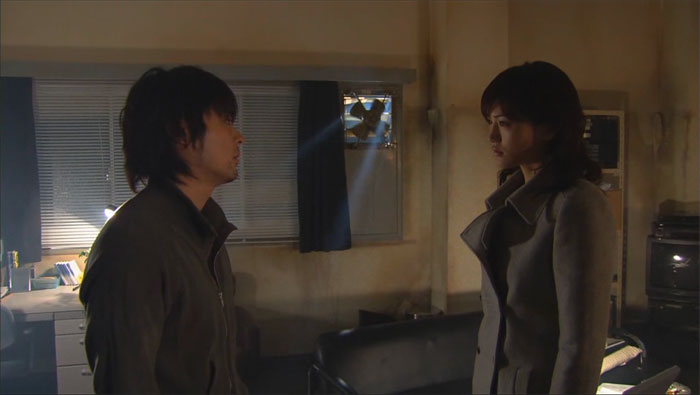
The novel doesn’t let us into the inner thoughts of Ryoji and Yukiho; we never see them alone or are given any indication that they know each other, so our impressions are formed from inferences and via their interactions with other characters. I found this interesting, for there is always distance between us and the people we think we know well – we can never know at any one time what they are truly thinking, and their reaction to us and to various events doesn’t always guarantee that they are showing their genuine selves to us. We aren’t shown the backstory of Yukiho and Ryoji except for the deaths of their parents, so whatever may have happened doesn’t colour our impression of them as we follow them through the years. There is little emotional baggage and it is almost as if they’ve been given a clean slate so that we can judge them on their current actions instead of allowing their past to cut them slack. We watch with fascination as they plot their way ahead, shedding a layer here or adding another façade there, without the other characters knowing they’ve been played. We can only imagine how dysfunctional their symbiotic relationship must have been, if there was indeed one, for it to have survived for so long – this hints at both of them capable of extremes instead of one manipulating the other. More than a detective thriller or tragedy, I thought Byakuyako to be a fascinating psychological study of two characters who, euphemistically speaking, made the best of the cards fate dealt them. Questions of nature vs nurture, the sort of (victim) mentality they had to psych themselves to be in over the years, and the extent to which they would go to protect their souls from that day (per Sasagaki) loom large. Whether their choices – if they had any – were right, or whether this was their true nature and what happened in the past was just the catalyst, we will never know. Then again, human nature has never been a neat puzzle of traits that fit some pre-designed logic of how things should be.


I was really peeved to know the drama’s synopsis gave the whole story away. It then showed the ending first, which did nothing to whet the appetite, and set the tone for it to be melodramatic. I have major issues with this, because such an approach kills the zing in the story and sucks out all the suspense. Instead of an intriguing character study, Ryoji and Yukiho turned into tragic characters who were victimised by shitty parents. It is situations like this where I don’t appreciate a more sympathetic approach to humanising characters – in the novel we needed to read between the lines to understand Ryoji and Yukiho, but in the drama, most things were served on a platter. The drama was told mostly from Ryoji’s perspective and he was painted as weak, pining for Yukiho all these years and willing to follow her lead for as long as she needed him. Despite his occasional outburst at her and prick of conscience (see episodes 4 and 5), Ryoji was almost always doing things at the behest of Yukiho, and it was disappointing to see him so spineless. There was very little push and pull that would have made their relationship more balanced in terms of power play, more dysfunctional and ruthless. I wanted to see Ryoji gaining the upper hand at some point and shedding his puppy dog look so that he could take charge, but it never came. It got to a stage where it was hard to argue that Ryoji’s actions were out of love for Yukiho, for she didn’t seem to love him much and his feelings for her bordered on obsession. I got really tired of Ryoji’s monologues that inevitably began with “Hey Yukiho…”, the constant refrain of “I want to walk with you under the sun once more”, the overuse of the light and darkness symbolism, and the incessant flashbacks to “that fateful night” where it all went to pieces for the kids.

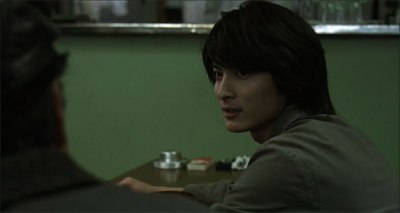
The film followed the novel’s structure by detailing events in chronological order, but was not able to string together a coherent narrative in such a short time span. It ended up pretty choppy, and scenes flashed by as though going through a roll call. Had I not known the story in advance, I’d have been thoroughly confused. The film did preserve the ambiguity of Ryoji and Yukiho’s relationship, but meshed characters together (a big sin) and couldn’t resist putting a melodramatic spin towards the end that made no sense at all. It also turned Yukiho into a person feared by the people around her, which completely missed the point of her character. Ryoji was less spineless and looked more capable of coming up with nefarious schemes but unfortunately his screen time and story arc took a back seat to Yukiho’s. As with the drama, almost none of the details that shaped Japan’s history in the story’s time frame were retained.
II. Secondary characters

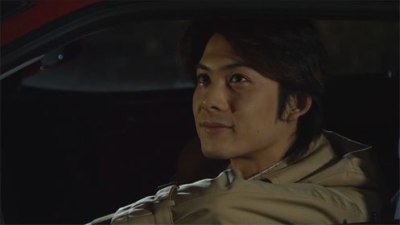
The two secondary characters that really matter throughout are Sasagaki and Shinozuka Kazunari, who was Yukiho’s college and dance club senpai. Neither featured heavily and for a section of the narrative, it was another detective, Imaeda, who took charge of the investigation when Kazunari hired him to look into Yukiho. In the second half of the novel, Kazunari somewhat drove the story along when he started realising Yukiho was not who she seemed, and I enjoyed his little sleuthing partnership with both Sasagaki and Imaeda. Over re-reads, Kazunari became my favourite character for his steadfastness towards his one-time girlfriend Eriko, and his care and concern for those who were affected by Yukiho’s actions. He just seemed like such a decent guy determined to do the right thing, and was a nice contrast to Ryoji, who was cold and disaffected and always had his nose in a plot or three. As for Sasagaki, I appreciate that he wasn’t some hard-nosed asshole cop; he just genuinely wanted to figure out the mystery and the true nature of Ryoji and Yukiho. You have to admire him for his dogged determination over the years to crack the case, and while he had his ways of ferreting out information, he wasn’t in your face or invasive about it.

The drama made Sasagaki the usual gnarled, crusty veteran cop – a staple of many a police procedural – who couldn’t wait to put Ryoji and Yukiho behind bars. He was presented as a threat to two young people who just wanted to get on with their lives, thereby adding to the melodramatic quotient. I understood why this change was made, but just didn’t see the point. It would have made for a more powerful drama to have Ryoji and Yukiho do what they did because of the nature of their characters, instead of having a “Big Bad” breathing down their necks – and he wasn’t even one because he was just doing his duty as a cop to arrest them. Kazunari got better treatment and the drama showed his short-lived romance with Eriko, which was sweet. However, he teamed up with Sasagaki because of Eriko instead of his cousin Yasuharu, who was omitted from the drama, and that made his reason somewhat flimsy because Kazunari would have no way of suspecting what happened to Eriko was not what it seemed until Imaeda reported his findings. The drama made it seem Kazunari wanted to rescue Yukiho so she wouldn’t tread the same path he did, which is nothing short of ridiculous (for this tenuous link to happen, the drama inserted a line by Eriko saying she found Kazunari and Yukiho similar in nature). Novel Kazunari never got righteous, but the drama just had to slot in that scene of him confronting Yukiho over her alleged misdeeds, and it lacked bite because it was so trite.


The film committed the cardinal sin of combining three characters into one – film Kazunari was the merger of Kazunari, Yasuharu, and Yukiho’s ex-husband Makoto. Lack of time cannot be an excuse for such an abomination. In the film, Kazunari married Yukiho and ended up a shadow of his smarmy self because he was afraid of her – and the film hadn’t shown anything she’d done for him to be scared. This change was so ridiculous and illogical that I couldn’t understand just why anyone would think it worked. It totally destroyed Kazunari’s character and made him such a wimp that Yukiho looked like a saint for even wanting to marry such a useless person. Sasagaki was much improved here as a gentler soul who just wanted to close the case and move on, and the film added a backstory about him losing his ill son because of his obsession with the case. As with the drama, the characters of Sasagaki and Imaeda were merged to have only Sasagaki driving the investigation.
III. Casting misses
I was neutral on Yamada Takayuki and Ayase Haruka in the leading roles before reading the novel, but it didn’t take me long after starting on the drama to feel that they were miscast. As the Ryoji and Yukiho of the drama, they were fine, but they were clearly not the novel’s characters and didn’t even come close.
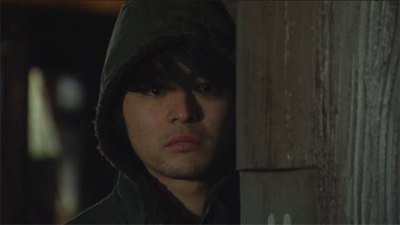

Ryoji: Yamada had too much of the hangdog puppy look going on, and even when he became slightly more comfortable in his second skin as a criminal, he still looked like he wished his whole life could be dedicated to worshipping Yukiho. Drama Ryoji was a mere facsimile of what novel Ryoji could have been, and it’s a pity the scriptwriter went this route. The development for Ryoji should have been better crafted for he was the one who epitomised this dark and lonely journey pretty much on his own, but he was depicted as fighting fire from elsewhere (such as Sasagaki, Matsuura and Yukiho’s various male interests) when the greatest struggle should have come from within himself – I guess the scriptwriters took too literally the point Sasagaki made about Ryoji still crawling in the duct after all these years. Yamada gave Ryoji some lovely, heartwrenching vulnerability, but could probably have done more with the role had it been meatier and darker; as it was, he never looked or felt the slightest bit evil – at most he was a misguided youth and so he remained.
Film-wise, Kora Kengo was a slight improvement over Yamada as he was less sad puppy and exuded more negative energy. His Ryoji also looked like he knew what he was doing and it was easier to believe this was a guy who would have no qualms running prostitution rings or committing murder, even if he didn’t like it, in order to survive. However, there wasn’t much Kora could do as his Ryoji played second, even third fiddle throughout the film.


Yukiho: Ayase fared slightly better as her Yukiho came off as somewhat sweetly manipulative, but she was thwarted by her various squinting instances when she was supposed to show more deep-seated emotions. In a scene about midway through the drama, Ryoji was watching Yukiho from a distance and saw her being dropped off by Kazunari. As Yukiho watched Kazunari drive away, Ryoji commented that she looked as though she had fallen in love – only for the camera to pan to Ayase squinting vilely and looking nothing like being in love or even remotely entertaining thoughts of it. I laughed at that, for she made Yukiho look like a child thwarted by some juvenile attempt to seize all the playground marbles. The problem with showing Yukiho as she is means it is blindingly obvious when she’s being fake, which misses the mark – Yukiho’s duality was not apparent unless one consciously looked for it. It would have been a greater challenge for Ayase to carefully balance the duality and still make the demure and unassuming side of her personality more natural even if it was effectively a learned skill. As it was, in the drama she often seemed skittish and uncomfortable, as though she knew someone would be around the corner waiting to bust her lies. There were certainly no “thorns in her eyes”, as Kazunari had once observed of her, and very little of the innate self-assuredness I had come to associate with Yukiho, a trait necessary to carry out her various schemes. In contrast, Fukuda Mayuko, the young actress for child Yukiho, turned in a nuanced and sensitive performance that stayed close to the novel.
Horikita Maki can’t act for toffee and the less said about her miserable Yukiho the better.

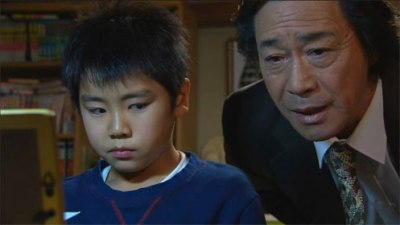
Sasagaki: Takeda Tetsuya must have done tons of these cop roles throughout his career, and while I have no issues with his portrayal of Sasagaki, I really didn’t see the need for him to spout Buddhist teachings and look menacing whenever he thought he was this close to nailing Ryoji and Yukiho. He was also presented with a lot of clues early on, so for him to take years to crack the case was a head-scratcher. The constant flashbacks drained my sympathy and Sasagaki just looked incredibly inept for taking so long to realise what we’d known from episode 1 – novel Sasagaki worked with scraps for years so we could better appreciate his persistence and resourcefulness, but drama Sasagaki had no such excuses. Funakoshi Eichiro was less abrasive and altogether nicer in the film, with the appropriate dose of jadedness and determination, and in that sense his performance leaned closer to the novel’s.

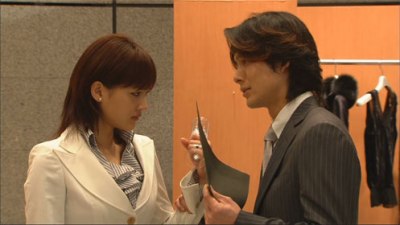
Kazunari: Kashiwabara Takashi played Kazunari in the drama and was generally decent. I thought he brought out the worldly charm of Kazunari well and could understand why both Eriko and possibly Yukiho would be attracted to him. Kashiwabara had some nice chemistry with Ayase and their scenes were pleasant to watch, although it’d have been better if he’d gotten a more stylish wardrobe. I thought it was a pity the drama skipped the segment where Kazunari got chills down his spine upon realising he was this close to falling under Yukiho’s spell at her mother’s funeral – that would have been a great bit to translate to screen. Instead we got Kazunari being sympathetic to Yukiho while she berated herself for not being a good daughter and not knowing how to love, which was boring. The weirdest scene in the drama was when he admonished Yukiho for ruining Ryoji’s life and urged her to turn herself in so Ryoji could have his life back – why would Kazunari even care about Ryoji, whom he didn’t know? The Eriko thread was left hanging as well, when I thought this would be a key reason why Kazunari would confront Yukiho. The film Kazunari was played by Kyo Nobuo, who should be banned from acting for making Kazunari smarmy and twitchy. It was really painful watching him and I can’t even blame this on the role being badly written.


Matsuura: This is a secondary, almost tertiary character who nevertheless had some impact on Ryoji’s growing-up years. Matsuura Isamu was an employee in the pawnshop run by Ryoji’s father, and was also having an affair with Ryoji’s mother. He later came back to haunt Ryoji and was finished off, leading to Yukiho burying him in the garden of her home. Watabe Atsuro and Tanaka Tetsushi played Matsuura in the drama and film, respectively, and both were solid, although Tanaka’s portrayal was sleazier and his Matsuura had the hots for Yukiho, so she got Ryoji to get rid of him. Watabe’s version was elevated into another “Big Bad” terrorising poor Ryoji into making counterfeit stuff and doing other bad things, when the boy just wanted to live a quiet life. I almost rolled my eyes at this change – I know it was done so poor Ryoji couldn’t catch a break, lurching from one crime to another, but such a move just showed Ryoji didn’t have much brains to begin with if he kept allowing Matsuura (and also Yukiho) to lead him by the nose. Frankly, he didn’t need help from Matsuura to eventually ruin himself.
IV. Excessive melodrama
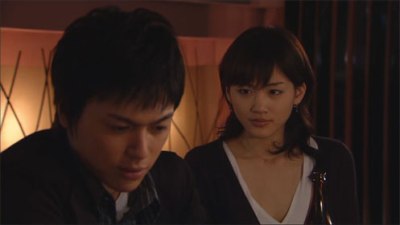

The drama was the biggest culprit, shoving the light vs darkness symbolism in the viewer’s face every chance it got, coupled with incessant flashbacks of the tragedy the children suffered. Every time it thought the viewer might forget why Ryoji and Yukiho were toying with other people’s lives, it inserted a flashback of Yukiho crying about wanting to walk with Ryoji under the sun again, and Ryoji crumbling like a ton of bricks because he couldn’t resist her tears. Unwarranted and unnecessary melodrama drains my sympathy quicker than anything else, and I was very tired of being reminded time and again why I needed to feel sorry for these two dysfunctional people. I have no issues with them being warped and operating on a logic that prizes their own survival ahead of anything else, so I would have liked to see more plotting, more cool-headed execution of schemes, instead of angst, tears and more tears. For example, Yukiho pretending to be self-sacrificing and then having an about-face not two seconds later was more interesting than her supposedly more emotional and vulnerable moments where she waxes lyrical about missing the boat in love. Far be it for me to deny the characters their chance at self-doubt and wondering if they could have done things differently, but this needed to be built up logically and the drama has been anything but subtle that viewers must sympathise with poor Ryoji and Yukiho. At some point, melodrama stops compensating for lack of viewer connection with the characters, and piling it on is just a quicker route to aversion.
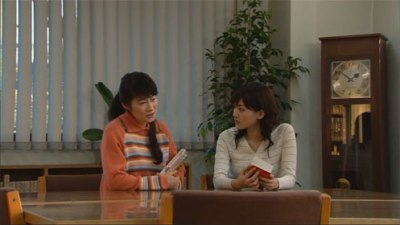

The drama added a librarian who was like a kindly mother figure to Ryoji and also advised Yukiho on her supposed love problems. I had no issue with that until it also showed they had been leaving anonymous messages on the library’s message board and also between the pages of books. That for me was instant facepalm – what part of “do not leave unnecessary traces” did these two not get? If nothing else, you’d think Yukiho would have the brains to realise that something as public as a message board would be scrutinised even if the messages were written anonymously. The film had a more ingenious take on how Ryoji and Yukiho communicated – they were leaving each other coded messages via the necklaces on stuffed toys in the library they used to frequent. Another flimsy link, that child Yukiho was reading Gone with the Wind, was also seized on and blown up in the drama, so that Ryoji and Kazunari reading the same book made it seem like they were fated to be inextricably linked to her.
V. The ending


It is safe to say that by the end of the drama, my sympathy level was zero and I did not care why or how Ryoji died. When you reveal the ending in the very first episode, it robs the viewer of the experience of following the characters through to the bitter end. It already sets the tone for what would come, and the last thing I want is for a drama to tell me how to feel right from the beginning. Yukiho practically gave herself away when she got emotional seeing the dying Ryoji and if Sasagaki had solid evidence, he’d have arrested her on the spot. She was then shown to continue spinning lies and eventually losing everything, as a cautionary tale of paying for her misdeeds, but I think it takes more guts to end it on a note of her getting off scot-free, like how it was in the novel. Ryoji’s death raises several interesting questions: had they planned this to be the way out if one of them was discovered? Was he tired of this underground life and saw death as an escape? Did he really mean to die for Yukiho or was it an accident? Was his death part of her scheme too? and so on and so forth. Yet both the drama and film made it seem that Ryoji lived and died for Yukiho, which simplifies the power dynamics between the two and reduces it to a tale of star-crossed love. Both added a scene where Sasagaki pleads with Ryoji to turn himself in and while it was melodramatic and worthy of an eye-roll, it was fairly in line with how Sasagaki was developed in these formats to be either too preachy or too kind.


In the end, even though I sound like I regretted watching the drama and film, I have them to thank for making me appreciate the novel all over again. I watched the drama with a lot of head-shaking and muttering of “this isn’t right”, so I concede that I was unable to give it a fair chance and shake off the comparisons. Despite this, the drama was fairly decent and watchable, with a pretty solid theme song by Shibasaki Kou. The film feels too choppy and confusing, but it follows the novel’s structure and retains the suspense. If Horikita’s expressionless face isn’t an issue, and the muted colour palette and ’80s feel are your kind of thing, the film is just about bearable.
The novel still reigns supreme and everyone should read it.
junny@1.29am

“Life as a purist is hard.”
Hahaha, I know where this post will head just by reading that first sentence. There was time when my friend stop to asked me to watch movie together or even when I was almost been thrown out from cinema for commenting too much on some movie adaptation, especially if it’s from novel or manga. So many little details which was skipped or fuse for the sake of duration. Drama should have more time, but for some reason they still fuse things and (because they still has time), drag the other thing. Remake is another case.
But now I start to learn to appreciate each as its own; I already know the story so it’s surely not a spoiler free so if the plot kind of move differently I can say “oh, so that how they want to show it” and just see it as if how I can see the story from other perspective, or as it’s real human portrayal I can appreaciate their acting, directing, and cinematography, how they transform written word or drawing to real thing. If it’s not for that, I may not come to enjoy Rurouni Kenshin or LOtR trilogy or Sherlock, even Nodame Cantabile (and a lot more) like I do. Fine, it doesn’t stop me from preaching and complaining, but on the other side there’s some critics who also will give bad review saying that the writer/director isn’t creative enough because they follow the original so closely. Poor them, it’s hard to please everyone, ne?
As for Byakukako, I just can’t watch the drama version. I tried, but can’t continue. As for the movie version, Kengo Kora is my bias so I have very soft spot for him, I will watch him in anything even when it involve Maki. And I’m quite used to jmovie where the plot doesn’t move smoothly so I can take it. It’s a pity though that they fuse some characters.
LikeLike
LOL yukari, so you know my pain. I understand it’s difficult when it’s novel to film, as the short time span means a lot of things will be left out. But like you said, dramas have more leeway, and certain things could be accommodated. At the very least, I ask for respect of the essence of the source material. I think for Byakuyako, I would have liked the drama better if it wasn’t so melodramatic, and if it understood what the source novel was all about. I don’t feel it did. The drama kind of just wanted to tell a sob story, so that was meh for me. Not the actors’ fault, of course, but there were quite a few misses for me even though they tried their best.
As for the film… sigh. Kora Kengo was fine in it, though I guess he was somewhat short-changed.
Next time, I should watch the adaptations first before reading the source material :p
LikeLike
Avoiding the original source will be hard as it come first and surely popular (they won’t make LA adaptation for unknown work right?). If I find an interesting book, there’s no way I can ignore it and wait until (don’t know when) they release LA adaptation. On the other hand, to make it worse, once they announce that there will be LA adaptation, nothing can stop me from watching it (I watch tons of Sherlock adaptation, including loose adaptation and even the crappy one!). And worst, if I haven’t read the original yet, the temptation to read it before watch it is too high (yes, I love spoiler!). Sigh, my only choice is to compromise.
Perhaps the drama turn to be melodrama because it was an era when Japan love melodrama (Ichi Ritoru no Namida, etc) or rather it was an era where most of adaptation didn’t give any justice to the original. Just compare Sorimachi’s GTO and Akira’s GTO, the former is more melo than the latter, right? Sadly, drama audience targets are different than reader afterall, not to mention that rating is everything so they’ll do everything for the sake of rating.
LikeLike
Well, not many adaptations do justice to the original, and of course there are adaptations that may be better than the original, but I find that I tend to be more forgiving if I’ve seen the adaptations first before reading the source material. It’s true, a lot of stuff is done for the ratings because it’s probably the easiest way to gauge if the drama is popular. I guess you’re right, we do have to compromise!
I haven’t seen the original GTO, though I did watch bits of the remake… didn’t really like it. Then again, I don’t generally like school stories with some sort of saviour character.
LikeLike
I agree with every single one of your points of comparison between the novel and its adaptations. I gave up on the drama after one too many scenes of Yukiho and Ryo looking constipated, and the movie actually made me quite angry (!). The Y and R of the novel were too busy doing what they were doing to stop and get depressed. As for what they were actually doing, I agree it is very far from being just a sob story. There are so many layers to their relationship and respective motives, a lot of it stemming from the nature of the original sin and how it affected each of them.
And now I’m going to make a very tentative suggestion that you take a look at the Korean movie adaptation, Baekyahaeang / Into the White Night. I know, I know: a lot of Korean versions of Japanese dramas are truly awful. But Korean films are a different kettle of fish – e.g. see the excellent Helpless (adapted from Miyabe Miyuki’s All She Was Worth), Broken (from Higashino’s The Hovering Blade) and Howling (from Nonami Asa’s The Hunter).
As a movie, Baekyahaeng has to take a lot of liberties to squeeze all that content into two hours. Perhaps the weirdest decision is that Imaeda and Kazunari are conflated into a single character, and that character is not just Yasuharu’s faithful employee but a woman. And not just a woman but someone whose devotion to her employer verges on love – and whose suspicion of Yukiho hence verges on jealousy. Another decision made by the writers was transforming the Sasagaki character into the third lead (probably because he’s played by the superstar Han Suk-kyu). That in itself is kind of ok, cos Sasagaki is arguably the most important character after Y and R – after all, the novel starts and ends with him. But even though the Korean Sasagaki does convey how he feels about Y and R’s motives, and his regrets over failing to stop them years ago, the Korean writers seemed to think that that isn’t enough. They had to give their Sasagaki another, more personal and much more melodramatic reason for pursuing Y and R. Arrrrgh…
But apart from the above, Baekyahaeng IMO is the truest to the spirit of the novel. Even the encounters between their Sasagaki and (female) Imaeda/Kazunari, though a lot messier and noisier than in the novel, kinda stay true to the prickly, suspicious yet ultimately sympathetic nature of Sasagaki, Imaeda and Kazunari’s interactions. But most importantly, the Korean Y and R seem to me to be the closest to the novel’s Y and R. Son Ye-jin really does have thorns in her eyes, and though there is one melodramatic scene where she apparently reveals her love for R, we’re never entirely sure of how exactly she feels about him. As an actor, Go Soo is not in Son’s league, but his R actually seems dangerous. The film also gets the closest to the ghastly possibility that R has inherited his father’s, er, proclivities, or is at least terrified that he has inherited or been infected by them.
Sorry for rabbiting on and on about this! Anyway, I’m so glad to have come across this wonderfully detailed comparison of the two Japanese screen adaptations and the source novel. The novel is one of my favourite Japanese novels, and I find it endlessly fascinating.
LikeLike
Hi! Sorry for the delayed reply, and thanks much for sharing your thoughts. I vaguely remember coming across Baekyahaeng but hadn’t been very interested as I’m not really into k-movies. Also, I’m a bit horrified, lol, by the changes you detailed for the k-movie, so I’m not sure how I feel about watching a movie where every other motive seems related to (obsessive) love. Go Soo is very nice to look at, haha, but I agree he doesn’t always have the range. I’ll KIV the movie though.
So glad to know you also enjoyed Byakuyako the novel, it’s really such a fascinating and absorbing read.
Ahh, your mentioning Higashino’s Hovering Blade reminds me I still have the 2021 Japanese drama to watch.
LikeLike
I have to admit that I really liked the drama, but again I have not read the novel – I have it though so hopefully I can find time to give it a go, it sounds much less melo than the drama lol. I don’t remember too many details about the Korean movie but did remember that I rather liked it, and Son Ye Jin is certainly the strongest actress out of the three.
Horikita Maki can’t act for toffee and the less said about her miserable Yukiho the better.
I didn’t bother with the Japanese movie precisely because of this (I lol’ed). She’s (was?) a rather grounded celeb so I have no problem w her as an actress, but no, girl can’t act to save her life haha. I thought she was cute in Hana Kimi (my first dorama ever) even if her acting was cringe, but after that I just couldn’t anymore with the (non) acting.
LikeLike
*I have no problem w her as a celebrity – very likeable. Just not as an actress :->
LikeLike
I hope you enjoy the novel! It’s pretty dense, but very much worth the time invested.
Horikita… yes, lol, she really couldn’t act. I skimmed Hana Kimi but she was so forgettable.
LikeLike